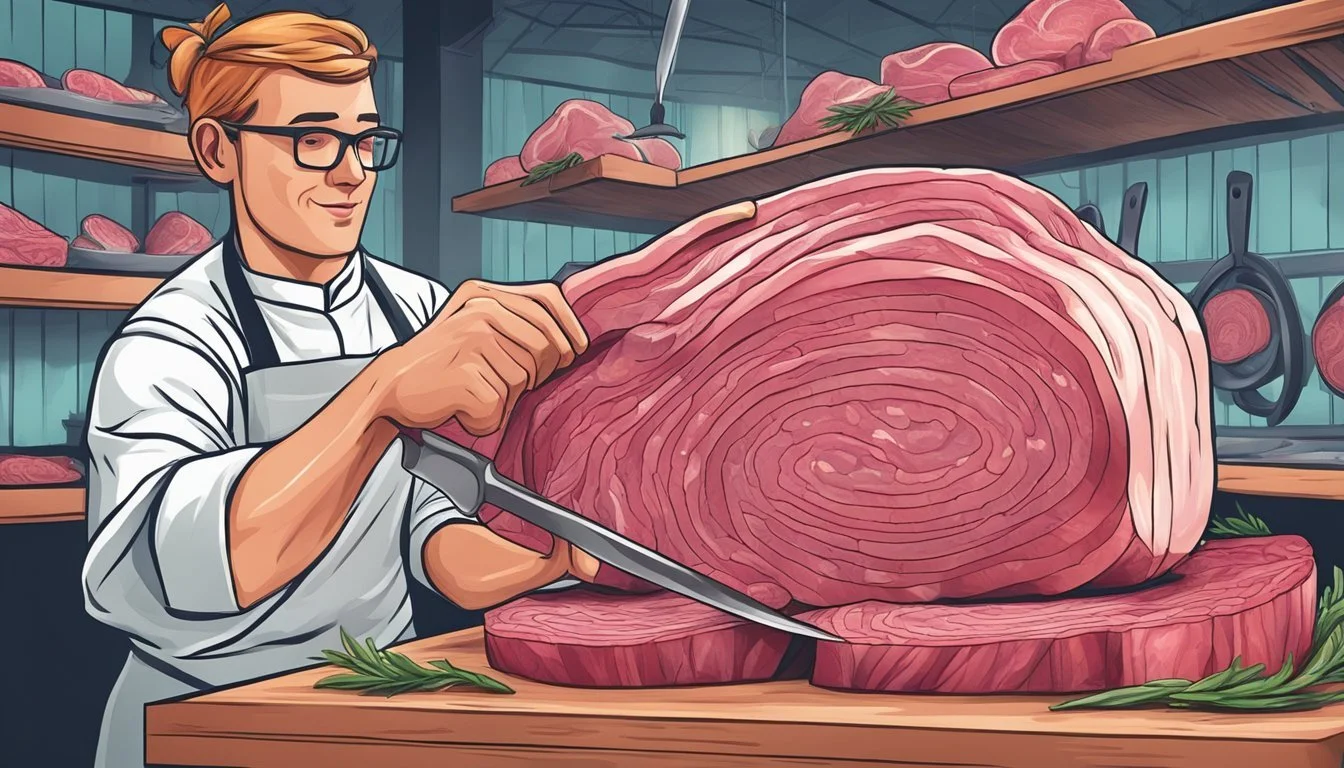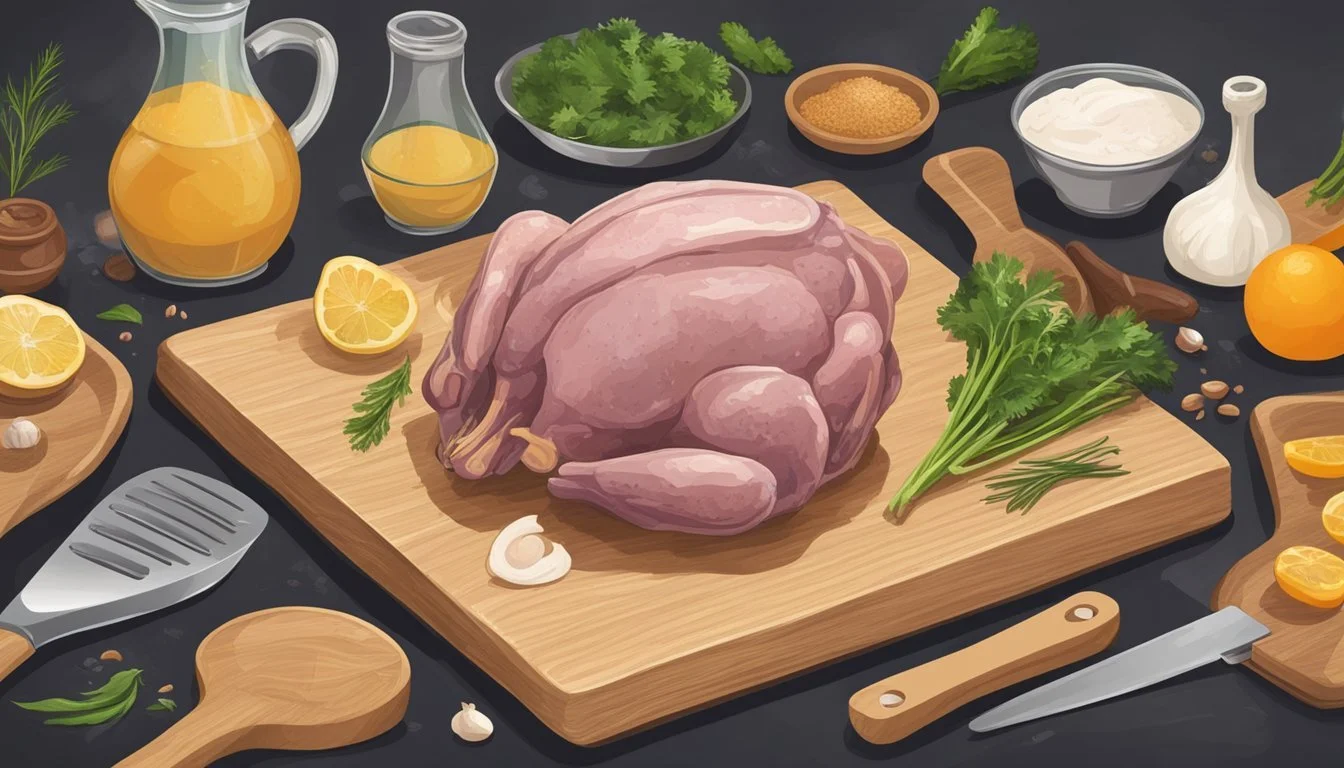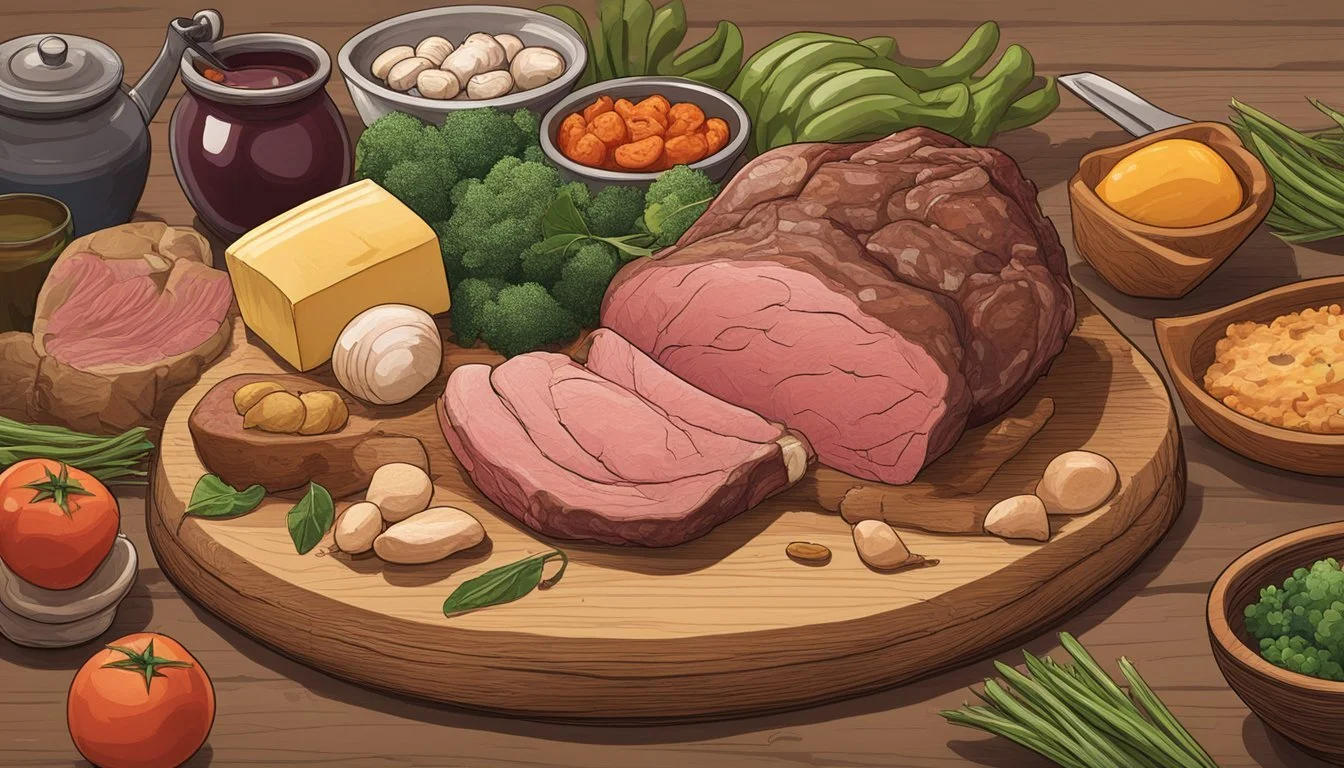Incorporating Bull Testicles into Your Carnivore Diet
A Nutrient-Rich Choice for Optimal Health
Incorporating bull testicles into your carnivore diet can provide a unique and nutrient-rich addition to your meal plan. These organ meats, often referred to as Rocky Mountain oysters, are packed with essential nutrients such as protein, vitamins, and minerals. Bull testicles are an excellent source of protein, vital for muscle growth, repair, and overall bodily functions.
Not only are they protein-rich, but bull testicles also offer vitamins like K2, D, B-12, A, and E. Their nutrient density makes them a powerful addition to any diet that emphasizes whole, animal-based foods. Adding bull testicles to your carnivore diet can contribute to a more comprehensive intake of essential nutrients, supporting various aspects of health.
For those following the carnivore diet, which focuses primarily on animal-based foods, integrating bull testicles can enhance your nutritional profile. This diet is known for its potential benefits for metabolic health, weight loss, and overall well-being. Exploring unconventional organ meats like bull testicles can diversify your meals while adhering to the principles of the carnivore diet.
Nutritional Profile of Bull Testicles
Bull testicles, also known as "Rocky Mountain oysters," are a nutrient-packed organ meat offering a range of health benefits. They are rich in vital vitamins, essential minerals, and high-quality proteins, making them an excellent addition to a carnivore diet.
Vitamins and Minerals Content
Bull testicles boast an impressive array of vitamins and minerals that support various bodily functions. Vitamins such as Vitamin K2, Vitamin D, B-12, Vitamin A, and Vitamin E are prevalent in bull testicles. These vitamins play crucial roles in bone health, immune function, and energy metabolism.
Minerals found in bull testicles include iron, zinc, selenium, and phosphorus. Iron aids in oxygen transportation in the blood, while zinc supports the immune system and wound healing. Selenium acts as an antioxidant, and phosphorus is essential for healthy bones and teeth. This comprehensive nutrient profile makes bull testicles a powerhouse of essential vitamins and minerals.
Protein and Amino Acids
The protein content in bull testicles is notable, providing a high-quality source of this macronutrient. Protein is essential for muscle growth, repair, and overall bodily functions. Bull testicles offer a complete protein profile, containing all essential amino acids required by the human body.
These amino acids support protein synthesis and muscle maintenance. The presence of testosterone in bull testicles can further aid in muscle development and energy levels. This makes bull testicles an exceptional choice for those looking to enhance their protein intake naturally.
Fat Composition
Bull testicles are low in fat and calories, making them a lean organ meat option. The fat present includes healthy omega-3 fatty acids, which are beneficial for heart health. These fatty acids help reduce inflammation, lower blood pressure, and support brain function.
The low-fat content also means that consuming bull testicles won't significantly impact one's daily caloric intake, making them suitable for those following a carnivore diet with calorie consciousness. The balance of lean protein and healthy fats provides a nutritious and satisfying addition to any meal plan focused on animal-based foods.
Health Benefits of Including Organ Meats
Incorporating organ meats into your diet offers several health benefits. These nutrient-rich foods can boost energy levels, support mental health, enhance immune function, and aid in muscle repair.
Boosting Energy and Metabolism
Organ meats like liver and heart are excellent sources of key nutrients that boost energy and enhance metabolism. Liver contains high levels of B vitamins, such as B12, which are crucial for energy production and reducing fatigue. Heart is rich in Coenzyme Q10 (CoQ10), pivotal for energy production at the cellular level. These meats also provide iron, which helps in the formation of red blood cells, improving oxygen transport and energy levels.
Mental Health Improvement
Consumption of organ meats can significantly benefit mental health. Liver is rich in vitamin A and choline, known to support brain function. It provides essential fatty acids and amino acids necessary for neurotransmitter production. Heart contains high concentrations of taurine, an amino acid that can help reduce anxiety and improve mood. Incorporating these meats can help manage or alleviate mental health conditions by supplying the brain with the nutrients it needs.
Enhancing Immune Function
Eating organ meats can strengthen the immune system. Liver and kidney are packed with vitamins A, D, and B6, vital for immune health. These vitamins contribute to the production of white blood cells, enhancing the body's ability to fight infections. Moreover, organ meats offer a good amount of zinc and selenium, crucial minerals that bolster immune response. Regular consumption of these meats can help maintain a robust immune system.
Supporting Muscle Repair and Growth
Organ meats are beneficial for muscle repair and growth due to their rich nutrient profile. Liver and heart are high in protein and amino acids, the building blocks of muscle tissue. They also contain creatine, which improves muscle strength and recovery. Furthermore, the iron and zinc found in organ meats contribute to faster muscle repair and growth. Including these meats in your diet supports overall muscle health and can improve physical performance.
Incorporation Strategies
When incorporating bull testicles into your carnivore diet, focus on creating a balanced meal plan, adding variety to your dishes, and understanding appropriate portion sizes and frequency. These steps will help you maximize the nutritional benefits of this unique organ meat.
Creating a Balanced Carnivore Meal Plan
A balanced carnivore diet should include a mix of muscle meats, organ meats, and potentially some dairy and fish for variety. Bull testicles can offer a rich source of protein and essential vitamins like B-12 and Vitamin K2. Consider integrating them with other meats such as beef, lamb, and chicken.
To ensure nutritional balance, schedule meals like breakfast consisting of scrambled eggs and cooked bull testicles, lunch with beef liver and steak, and dinner featuring slow-cooked lamb and bull testicles. This approach ensures you get a varied nutrient intake.
Preparing Nutritious Meals with Variety
Adding bull testicles to your meal rotation can be exciting and nutritious. They can be grilled, fried, or cooked in stews. Experiment with marinating them in different spice blends to enhance flavor and incorporate them in recipes that normally use muscle meat.
For example, swap beef chunks for bull testicles in a hearty stew or fry them up with onions and mushrooms for a savory dish. This not only keeps meals interesting but also ensures a comprehensive nutrient profile from diverse sources.
Understanding Portion Sizes and Frequency
Consuming organ meats like bull testicles should be done in moderation, typically recommended a couple of times a week. For instance, a serving size of about 3-4 ounces provides ample nutrients without overconsumption.
Balancing them with muscle meats and other animal products ensures that the intake of vitamins and minerals is spread evenly without exceeding dietary needs. Regularly including them in your diet in appropriate portions contributes to a healthy and varied carnivore lifestyle, enhancing the benefits of this dietary choice.
Carnivore Diet Fundamentals
The carnivore diet focuses on consuming only animal-based foods, excluding all plant-derived ingredients. It emphasizes nutrient-dense options and aims for maximized nutrient absorption and bioavailability.
Meats and Animal Products
The foundation of the carnivore diet includes meats and animal products. Common choices are:
Beef: Steaks, ground beef, roasts.
Pork: Pork chops, bacon, ribs.
Chicken: Breasts, thighs, wings.
Fish: Salmon, sardines, mackerel.
Eggs: Chicken eggs, duck eggs.
Dairy: Cheese, butter, heavy cream.
Organ meats such as liver and kidneys are often included due to their high nutrient content. Liver is particularly valued for its concentrations of B vitamins, iron, and vitamins A, D, and K. These foods provide a broad spectrum of essential nutrients, contributing to heart health and preventing nutrient deficiencies.
Excluding Plant-Based Foods
The carnivore diet strictly excludes plant-based foods. This means:
No fruits, vegetables, grains, or legumes.
No plant oils or vegan substitutes.
The rationale behind this exclusion is to avoid substances like fiber and certain plant toxins that some believe may contribute to digestive issues or interfere with nutrient absorption. By eliminating these foods, adherents aim to simplify digestion and improve overall health by relying solely on animal products.
Nutrient Absorption and Bioavailability
A key principle of the carnivore diet is enhancing nutrient absorption and bioavailability. Animal-based foods are considered more bioavailable, meaning the body can efficiently absorb and utilize the nutrients they contain. For example, iron from red meat is absorbed better than iron from plant sources.
Collagen from meat and bones supports skin and joint health. Fats from animal products aid in the absorption of fat-soluble vitamins like A, D, E, and K. The focus on nutrient-dense foods helps ensure that those following the diet receive adequate vitamins and minerals, potentially addressing issues like iron or B12 deficiencies often found in plant-based diets.
This approach is designed to maximize the nutritional yield from food while maintaining a straightforward dietary regimen.
For the largest selection, try buying iron or vitamin B12 supplement online!
Potential Health and Lifestyle Benefits
The incorporation of bull testicles, also known as "Rocky Mountain Oysters," into a carnivore diet offers numerous health and lifestyle benefits. These benefits span from effective weight management to improved blood sugar control and reduced inflammation.
Weight Management and Loss
Bull testicles are rich in protein, making them a valuable addition to a diet focused on muscle growth and maintenance. High protein intake can promote satiety, helping individuals reduce calorie consumption and manage their weight more efficiently.
The carnivore diet itself, being low in carbohydrates and high in fats and proteins, can support metabolic processes such as ketosis. Ketosis promotes fat burning as a primary energy source, aiding in weight loss. Consuming nutrient-dense foods like bull testicles can enhance these benefits by providing essential vitamins and minerals that support metabolism.
Managing Blood Sugar and Insulin Resistance
The carnivore diet is recognized for its potential to improve blood sugar levels and manage insulin resistance. By minimizing carbohydrate intake, the diet helps stabilize blood sugar, reducing the spikes and crashes associated with high-carb meals. Bull testicles, being low in carbohydrates, fit well within this dietary framework.
Rich in specific nutrients such as Vitamin K2 and Vitamin D, bull testicles can support overall metabolic health, which is crucial for individuals managing diabetes or at risk of developing type 2 diabetes. These nutrients play a role in improving insulin sensitivity and regulating blood sugar levels, promoting a more balanced metabolic state.
Reducing Inflammation and Autoimmune Conditions
Chronic inflammation and autoimmune conditions can be mitigated through dietary choices. The carnivore diet is often praised for its anti-inflammatory effects, largely due to the elimination of processed foods and potential allergens. Bull testicles contribute to this benefit by being a natural, nutrient-dense food that is unlikely to trigger food sensitivities.
They are excellent sources of essential fatty acids and antioxidants, which can reduce inflammation and improve overall well-being. Nutrients like Vitamin E and zinc found in bull testicles also play a role in supporting the immune system and reducing inflammatory responses, which is beneficial for those dealing with autoimmune conditions and chronic inflammatory diseases.
Considerations and Precautions
Adding bull testicles to a carnivore diet introduces a new nutritional component that requires careful consideration. Important factors include consulting a healthcare professional, being aware of possible side effects, and addressing any dietary restrictions or allergies.
Consulting a Healthcare Professional
Before introducing bull testicles into the diet, consulting with a healthcare professional is crucial. They can provide personalized advice based on individual health status and dietary needs. This is especially important for individuals with pre-existing health conditions like heart disease, diabetes, or metabolic disorders. A professional will help assess potential benefits and risks, ensuring that the new dietary addition aligns with overall health goals.
Possible Side Effects and Dietary Adjustments
Some individuals may experience side effects when incorporating new foods into their diet, including bull testicles. Digestive issues such as bloating, gas, or changes in bowel movements are possible, especially if one’s gut is not accustomed to organ meats. Gradual adaptation can help mitigate these effects. Monitoring how the body reacts and making necessary dietary adjustments is key.
Side Effects:
Digestive issues (bloating, gas)
Allergic reactions
Nutrient imbalances
Adjustments:
Gradual introduction
Increasing water intake
Monitoring nutrient intake
Dealing with Dietary Restrictions and Allergies
Those with specific dietary restrictions or allergies need to be cautious. Bull testicles are nutrient-dense but may not be suitable for everyone. Individuals with allergies to particular proteins or sensitivities should consult with a healthcare professional to avoid adverse reactions. If a known allergy or intolerance exists, choosing an alternative source of nutrients is advisable. This ensures that nutritional needs are met without compromising health.
When dealing with dietary restrictions, it's important to:
Read labels carefully
Introduce new foods slowly
Keep a food diary to track symptoms
These steps will help in maintaining a balanced diet and preventing unwanted side effects.
Cooking and Preparation Tips
Incorporating bull testicles into your diet can enhance your nutrient intake. Focus on safe handling, versatile recipes, and creative cooking methods for a tasty and simple dining experience.
Handling and Safe Food Practices
Safe handling is essential for maintaining hygiene and the quality of bull testicles. Begin by thoroughly cleaning them under cold, running water. Trim any connective tissue or unwanted parts. Always use separate cutting boards and utensils for raw and cooked products to prevent cross-contamination. Maintain refrigeration up to the point of cooking and cook to an internal temperature of 160°F to ensure safety.
Simple and Delicious Recipes
Grilled Bull Testicles: Marinate with olive oil, garlic, salt, and pepper. Grill on medium-high heat for 5-7 minutes per side.
Fried Bull Testicles: Slice thinly, coat with seasoned flour, and fry in hot oil until golden. Serve with a dipping sauce like tzatziki or aioli.
Boiled and Sautéed: Parboil for 20 minutes, then sauté with butter and herbs for a tender texture and rich flavor.
Innovative Cooking Methods
Sous Vide: Seal with herbs and cook at 135°F for 1.5 hours. Finish by searing on a hot pan for a crisp exterior.
Smoked: Rub with spices, smoke at 225°F for 2-3 hours. This method infuses a rich smoky flavor and preserves nutrients.
Try these methods to explore different textures and tastes, all while maintaining a straightforward approach suitable for any animal-based diet enthusiast.
Advocacy for Carnivore Diet
Advocates of the carnivore diet focus on its potential for addressing various health issues, such as diabetes, mental health conditions, and metabolic diseases. They also emphasize the diet's simplicity and nutrient density.
Debunking Myths and Common Misconceptions
One common myth is that the carnivore diet lacks essential nutrients found in plant-based foods. This is not necessarily true. Nutrients like vitamins and minerals can be adequately met by consuming a variety of organ meats, which are nutrient-dense. For instance, bull testicles provide essential nutrients such as zinc, vitamin B12, and selenium.
Another misconception is that consuming only animal products is harmful to long-term health. Several testimonials and preliminary studies suggest that many individuals experience improvements in conditions like arthritis and eczema after adopting the diet, indicating its potential benefits.
Community and Support
A strong sense of community helps individuals adhere to and thrive on the carnivore diet. Online forums, social media groups, and local meetups offer platforms for sharing experiences, recipes, and advice. These communities often provide emotional and practical support, making it easier to navigate the challenges associated with dietary changes.
Many advocacy organizations and influencers have emerged, promoting the diet's benefits and offering resources. They help to demystify the diet and provide scientific backing for those interested in starting a carnivore lifestyle.
Promoting Sustainable and Ethical Choices
Sustainability and ethics are important aspects of the carnivore diet advocacy. Many proponents emphasize sourcing meat from grass-fed, humanely-raised animals. This not only supports animal welfare but also potentially results in higher-quality, more nutrient-dense meat.
Advocates argue that sustainable farming practices can have a positive environmental impact. Rotational grazing, for instance, can improve soil health and reduce carbon emissions. By promoting these practices, supporters of the carnivore diet aim to reduce the negative environmental footprint associated with conventional meat production.
In summary, adherence to sustainable and ethical practices addresses concerns about the environmental and ethical implications of a meat-centric diet.
Beyond Diet: Lifestyle Integration
Incorporating bull testicles into a carnivore diet requires an integrative approach that includes regular physical activity, mindful stress management practices, and adaptability for long-term success.
Exercise and Physical Activity
Physical activity is crucial for anyone adopting a carnivore diet, especially athletes seeking to maximize nutrient absorption and muscle recovery. Regular exercise boosts energy levels and improves cardiovascular health, essential for a high-protein diet. Activities like resistance training, high-intensity interval training (HIIT), and cardiovascular exercises enhance overall fitness and performance. Stretching and flexibility exercises complement rigorous workouts, reducing the risk of injury.
For those aiming for peak cognitive function, incorporating bull testicles for their nutrient density can support enhanced physical performance. A balanced exercise regimen aids in achieving health objectives and maintaining consistent energy levels.
Mindfulness and Stress Management
Managing stress is as important as diet and exercise for overall wellness. Techniques such as meditation, deep breathing exercises, and yoga can help mitigate the effects of stress. These practices support mental health, promoting clearer thinking and better concentration, which align with the cognitive benefits of a carnivore diet.
Mindfulness practices also aid in maintaining dietary discipline and improving sleep quality, crucial for recovery and energy. Consistent practice in mindfulness can lead to a more balanced and harmonious lifestyle, essential for sustaining any rigorous dietary regimen.
Long-Term Success and Adaptability
Long-term success in integrating bull testicles into a carnivore diet hinges on adaptability and continued evolution of one’s dietary habits. Monitoring one’s physical responses and adjusting meal plans is vital. Flexibility in diet allows individuals to tailor their nutrition to personal health objectives and physical needs.
Regular health check-ups and consultations with nutritionists ensure nutritional adequacy and help in making informed adjustments. For athletes, adapting diet plans can enhance performance and recovery, supporting their rigorous training regimens. This adaptable approach ensures sustained energy levels and overall wellness over time.
Comparison with Other Diets
Incorporating bull testicles into a carnivore diet provides a unique nutritional profile. This section compares this diet approach with three other popular diets: keto, paleo, and vegetarian/vegan.
Keto Diet and Zero-Carb Variations
The keto diet focuses on inducing ketosis through high-fat, moderate-protein, and low-carb intake. Bull testicles, rich in protein and low in carbs, align well with keto principles.
They provide essential amino acids that support muscle growth and repair. Zero-carb variations of the keto diet mirror the carnivore diet more closely, emphasizing meat-based nutrition. While the keto diet allows for some plant-based fats, the carnivore diet relies solely on animal sources for fats and proteins.
Paleo and Ancestral Dieting Approaches
The paleo diet emphasizes foods presumed to be eaten by early humans, such as meats, vegetables, fruits, and nuts. Bull testicles fit comfortably within the paleo framework due to their high nutrient density and status as organ meat.
Proponents of ancestral dieting argue that consuming every part of the animal, including testicles, can offer unique health benefits. Unlike the strict carnivore approach, paleo encourages a variety of plant-based foods, including vegetables and fruits. The inclusion of bull testicles in a paleo diet can help mimic a more authentic ancestral eating pattern.
Vegetarian and Vegan Dietary Comparisons
Vegetarian and vegan diets exclude animal products to varying degrees. Bull testicles are understandably incompatible with these diets. Vegetarians might consume eggs and dairy but avoid all meats, while vegans exclude all animal-derived products.
These diets rely on grains, legumes, vegetables, and fruits to meet nutritional needs. The high protein and nutrient content of bull testicles offer benefits that plant-based proteins might not provide, such as complete amino acid profiles and high levels of certain vitamins and minerals. Comparatively, a carnivore diet’s reliance on organ meats like bull testicles ensures the intake of specific nutrients that are challenging to obtain through plant-based foods alone.
Conclusion
Incorporating bull testicles into a carnivore diet presents a unique way to enhance one’s nutrient intake. Rich in protein and essential vitamins, they support muscle growth and repair, making them a valuable addition for those focusing on muscle health.
When paired with other nutrient-dense foods like beef liver and seafood, bull testicles help create a balanced and sustainable dietary regimen. Including a variety of organ meats ensures a comprehensive intake of nutrients.
Bull testicles can also complement the heart and liver, two other organ meats, providing a broad spectrum of minerals and vitamins that support overall bodily functions. The inclusion of such nutrient-rich foods can help address and prevent nutrient deficiencies commonly associated with restrictive diets.
Given their high nutrient density, bull testicles are a powerful addition to a carnivore diet, contributing to improved health and well-being.














